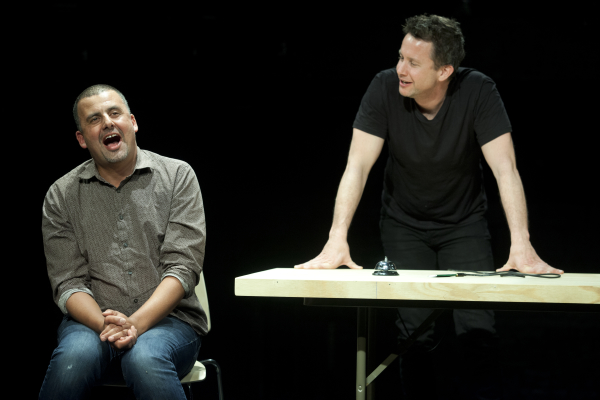Winners and Losers

(© Pavel Antonov)
You may question if you're even seeing a scripted play at all in Marcus Youssef and James Long's Winners and Losers, now making its New York debut at Soho Rep. Much of the dialogue feels improvised. There's no costume designer. The two actors (Youssef and Long) refer to each other by their real names, dredging up painfully personal details about each other's real lives and scattering them on stage. After several iterations of TV's Big Brother and Real Housewives, have we finally arrived at the age of Reality Theater?
Of course, Youssef and Long's repartee is a lot more astute than anything you're likely to hear on Bravo, even though it springs from a highly reductive premise. The setup resembles that of a game show or half hour of punditry on CNN. The two Canadian theater-makers sit at opposite ends of a long wooden table. One brings up a topic and they immediately begin to debate whether that thing is, in the grand scheme of things, a "winner" or "loser." Mexico: loser. Goldman Sachs: winner. The two men are divided on Occupy Wall Street, with Long declaring the movement a loser for failing to prompt any real reforms and Youssef calling it a winner for changing the vocabulary of wealth inequality. Youssef pivots, "Stephen Hawking: That's a good one, eh?" Both men agree that the world-famous cosmologist is a winner.
Youssef and Long are highly intelligent and have the ability to jump from topic to topic at lightning speed, leaving your mind swimming. They're also very funny and seem to genuinely enjoy their back-and-forth. In fact, through their humor and smiles you might not notice their genial Canadian politeness slowly morphing into something a lot more vicious.
Eventually, things get personal. Long brings up Youssef's father, an Egyptian immigrant who became a wealthy banker. Obviously, he's a winner. Although Youssef suggests that his dad can only express love through money (ex. the sizable checks he gives his son on his birthday) and this saddens him. Long is unsympathetic. His dad was a mountie and never gave him anything. Long accuses Youssef of being a "tourist" with his progressive politics, slumming it with Marxist community activists by day then going home to a $1 million home at night. Youssef stutters and seems to shrink away under such sustained personal attacks. Long leans back and grins, conjuring the image of a cat toying with its prey.
Of the two men, Long is definitely the more compelling debater. His points are forceful, delivered with witty flair, and endowed with a ring of truth. Yet he's also the crueler party, with an almost maniacal drive to crush his opponent. A menacing anger seems to boil just under the surface, liable to explode at any moment. He may be this debate's "winner," but at what cost? And even though he's won this battle, one suspects that the soft-spoken and erudite Youssef will win the war: He stands to inherit a fortune, while Long's financial security is dubious. Perhaps Youssef can afford to be the polite one, losing debate after debate, secure in his status as a "winner" in the larger tapestry of Western capitalism.
Some people (particularly the politically disinclined) will find this tedious, like being trapped in a corner at a party with the two most opinionated individuals. Everyone will feel uncomfortable when they begin assessing each other's privilege. The game is no longer fun. Director Chris Abraham makes sure to exacerbate this tension with pregnant pauses in which the actors stare out at the audience as if to invite our response. An extended wrestling match between the two middle-aged thespians breaks up the evening and feels like a blunt object beating us over the head with the show's thesis: Much of our society is based on brutal competition, in which not all the combatants have an equal shot.
It also highlights one clear difference between live theater and TV: Safe in our livings rooms, we may clutch our pinot gris and cackle when New Jersey Housewives Teresa and Danielle go at it on screen. But would we be so giddy if that throwdown were happening in the same room? By the end of Winners and Losers, no one was laughing. Perhaps Reality Theater is the antidote to a culture that increasingly craves real conflict as a source of entertainment.











